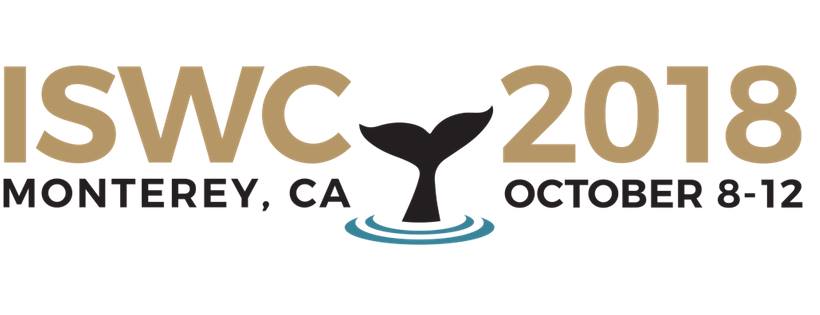 We are very pleased to announce that our group got 3 papers accepted for presentation at ISWC 2018: The 17th International Semantic Web Conference, which will be held on October 8 – 12, 2018 in Monterey, California, USA.
We are very pleased to announce that our group got 3 papers accepted for presentation at ISWC 2018: The 17th International Semantic Web Conference, which will be held on October 8 – 12, 2018 in Monterey, California, USA.
The International Semantic Web Conference (ISWC) is the premier international forum where Semantic Web / Linked Data researchers, practitioners, and industry specialists come together to discuss, advance, and shape the future of semantic technologies on the web, within enterprises and in the context of the public institution.
Here is the list of the accepted papers with their abstract:
- “EARL: Joint Entity and Relation Linking for Question Answering over Knowledge Graphs” by Mohnish Dubey, Debayan Banerjee, Debanjan Chaudhuri and Jens Lehmann (Research Track)
Abstract: Many question answering systems over knowledge graphs rely on entity and relation linking components in order to connect the natural language input to the underlying knowledge graph. Traditionally, entity linking and relation linking has been performed either as a dependent, sequential tasks or as independent, parallel tasks. In this paper, we propose a framework called EARL, which performs entity linking and relation linking as a joint task. EARL implements two different solution strategies for which we provide a comparative analysis in this paper: The first strategy is a formalization of the joint entity and relation linking tasks as an instance of the Generalised Travelling Salesman Problem (GTSP). In order to be computationally feasible, we employ approximate GTSP solvers. The second strategy uses machine learning in order to exploit the connection density between nodes in the knowledge graph. It relies on three base features and re-ranking steps in order to predict entities and relations. We compare the strategies and evaluate them on a dataset with 5000 questions. Both strategies significantly outperform the current state-of-the-art approaches for entity and relation linking.
- “DistLODStats: Distributed Computation of RDF Dataset Statistics” by Gezim Sejdiu, Ivan Ermilov, Jens Lehmann and Mohamed Nadjib Mami (Resources Track)
Abstract: Over the last years, the Semantic Web has been growing steadily. Today, we count more than 10,000 datasets made available online following Semantic Web standards. Nevertheless, many applications, such as data integration, search, and interlinking, may not take the full advantage of the data without having a priori statistical information about its internal structure and coverage. In fact, there are already a number of tools, which offer such statistics, providing basic information about RDF datasets and vocabularies. However, those usually show severe deficiencies in terms of performance once the dataset size grows beyond the capabilities of a single machine. In this paper, we introduce a software library for statistical calculations of large RDF datasets, which scales out to clusters of machines. More specifically, we describe the first distributed in-memory approach for computing 32 different statistical criteria for RDF datasets using Apache Spark. The preliminary results show that our distributed approach improves upon a previous centralized approach we compare against and provides approximately linear horizontal scale-up. The criteria are extensible beyond the 32 default criteria, is integrated into the larger SANSA framework and employed in at least four major usage scenarios beyond the SANSA community.
- “Synthesizing Knowledge Graphs from web sources with the MINTE+ framework” by Diego Collarana, Mikhail Galkin, Christoph Lange, Simon Scerri, Sören Auer and Maria-Esther Vidal (In-Use Track)
Abstract: Institutions from different domains require the integration of data coming from heterogeneous Web sources. Typical use cases include Knowledge Search, Knowledge Building, and Knowledge Completion. We report on the implementation of the RDF Molecule-Based Integration Framework MINTE+ in three domain-specific applications: Law Enforcement, Job Market Analysis, and Manufacturing. The use of RDF molecules as data representation and a core element in the framework gives MINTE+ enough flexibility to synthesize knowledge graphs in different domains. We first describe the challenges in each domain-specific application, then the implementation and configuration of the framework to solve the particular problems of each domain. We show how the parameters defined in the framework allow to tune the integration process with the best values according to each domain. Finally, we present the main results, and the lessons learned from each application.
Acknowledgment
This work has received funding from the EU Horizon 2020 projects BigDataEurope (GA no. 644564) and QROWD (GA no. 723088), the Marie Skłodowska-Curie action WDAqua(GA No 642795), and HOBBIT (GA. 688227), and (project SlideWiki, grant no. 688095), and the German Ministry of Education and Research (BMBF) in the context of the projects LiDaKrA (Linked-Data-basierte Kriminalanalyse, grant no. 13N13627) and InDaSpacePlus (grant no. 01IS17031).
Looking forward to seeing you at The ISWC 2018.

